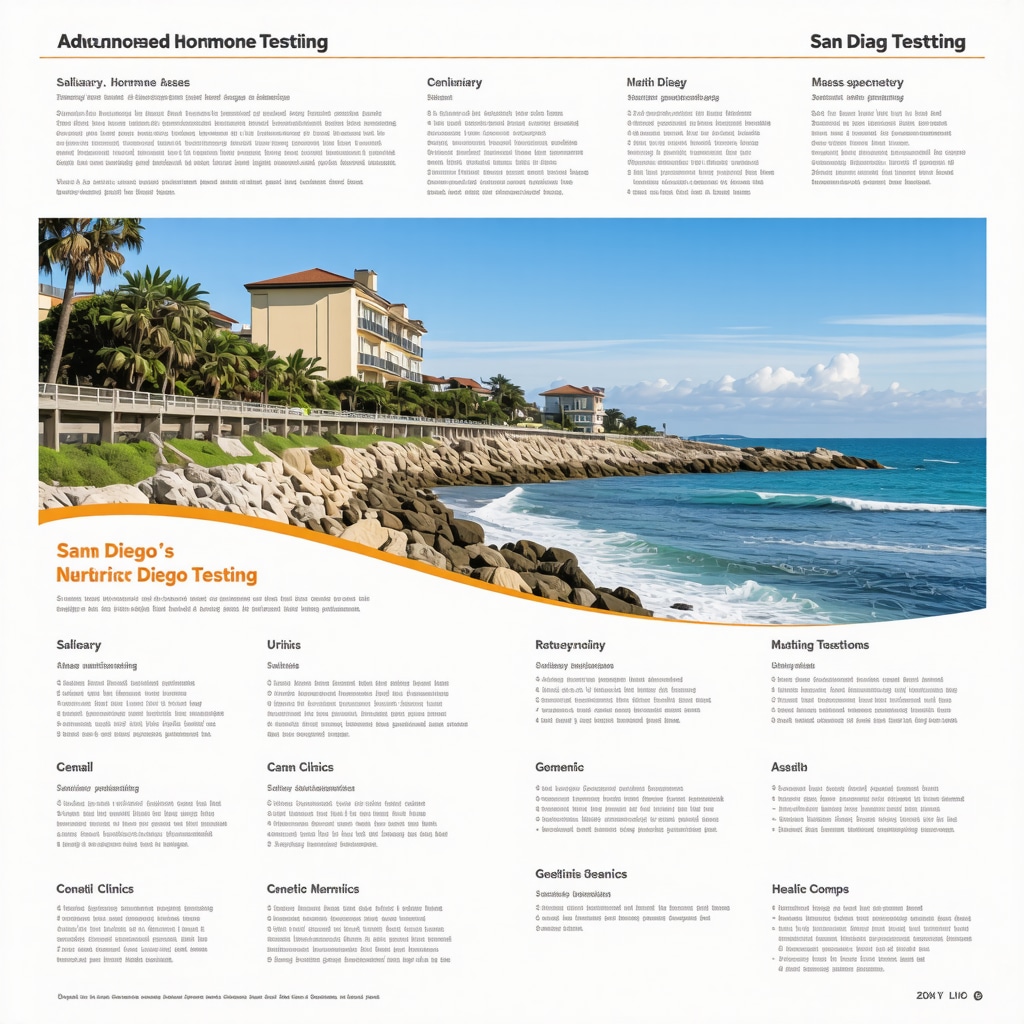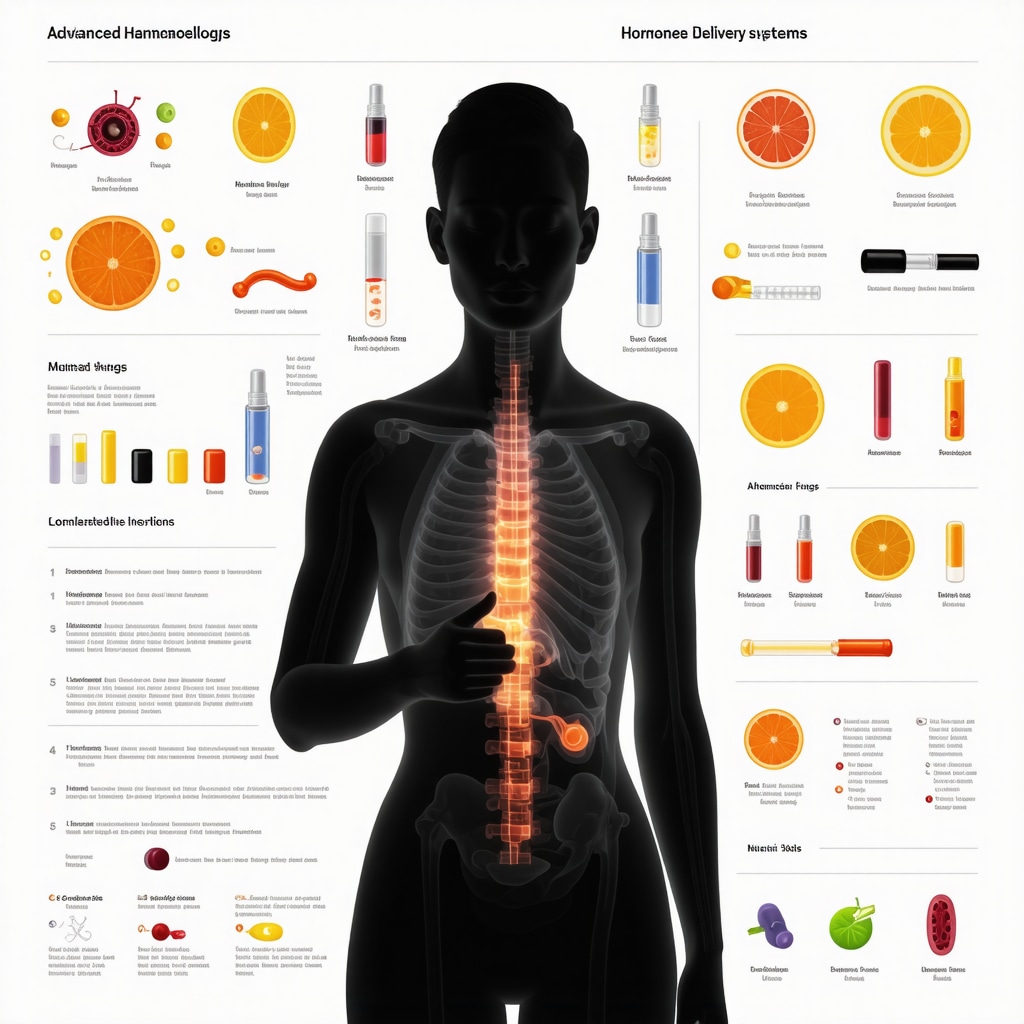Unlocking the Secrets of Natural Hormone Therapy in San Diego
As women navigate the complexities of hormonal changes, especially during perimenopause and menopause, the quest for natural, effective hormone therapy options becomes paramount. In San Diego, 2025 ushers in innovative approaches emphasizing bioidentical hormones and holistic care tailored specifically for women seeking balance without compromising wellness. This article delves into the best natural hormone therapies available locally, blending scientific expertise with practical experience to empower informed decisions.
Why San Diego Women Are Turning to Natural Hormone Optimization
San Diego’s unique lifestyle and environment encourage proactive health management. Many women here prefer therapies that harmonize with their bodies, minimizing synthetic interventions. Natural hormone therapy, especially bioidentical hormone replacement, mirrors the molecular structure of endogenous hormones, offering a personalized alternative to conventional treatments. This approach supports symptom relief from hot flashes, mood swings, and weight gain with fewer side effects, enhancing quality of life.
How Does Bioidentical Hormone Therapy Differ from Traditional Treatments?
Unlike traditional hormone replacement therapies that often use synthetic hormones, bioidentical hormone therapy uses compounds chemically identical to those the human body produces. This molecular mimicry facilitates better receptor binding and metabolism, often resulting in improved symptom control and reduced adverse reactions. For example, pellet therapy—a method popular in San Diego—provides steady hormone release, avoiding the peaks and troughs typical in oral or patch applications. The nuanced delivery system exemplifies how natural hormone therapies optimize hormonal balance more effectively.
Integrating Herbal and Lifestyle Solutions for Hormonal Harmony
Complementing bioidentical therapies with carefully selected herbal supplements can enhance therapeutic outcomes. Herbs like black cohosh, chasteberry, and maca root have historical and clinical support for alleviating menopausal symptoms and supporting endocrine function. Moreover, San Diego’s emphasis on outdoor activity and nutrition-rich diets naturally complements hormone optimization strategies. Exercise, stress management, and sleep hygiene play indispensable roles in sustaining balanced hormones.
What Should Women Expect During Their Natural Hormone Therapy Journey in San Diego?
Embarking on natural hormone therapy involves thorough hormone testing and personalized treatment plans crafted by expert clinicians specializing in female hormone health. San Diego’s leading practitioners focus on continuous monitoring and adjustment, ensuring therapies evolve with patients’ changing needs and lifestyle factors. Recovery timelines and therapy responses vary; thus, patient education and open communication are critical components of success.
Experience Matters: Real Stories from San Diego Women Embracing Natural Hormone Therapy
Consider the case of Maria, a 52-year-old San Diego resident who struggled with severe menopausal symptoms disrupting her career and family life. After transitioning to bioidentical pellet therapy combined with herbal supplements and lifestyle changes, she reported significant improvements in energy, mood stability, and weight management within months. Maria’s journey underscores the potential of integrative, natural hormone therapies to restore vitality and hormonal equilibrium.
For those interested in exploring these options further, customized bioidentical hormone replacement therapy in San Diego offers a gateway to personalized care that respects individual biochemistry and health goals.
Discover more about managing menopause weight gain and the role of BHRT by visiting this expert resource to deepen your understanding.
Trusted sources such as the North American Menopause Society provide invaluable evidence-based insights supporting the safety and efficacy of bioidentical hormone therapies, reinforcing confidence in these natural approaches (Menopause Society – Bioidentical Hormones).
If you have experiences or questions about natural hormone therapy, feel free to reach out to local experts or share your story to support others in the community.
Embracing a Holistic Approach: More Than Just Hormones
When I first started exploring natural hormone therapy in San Diego, I quickly realized it was about much more than just the hormones themselves. It became a journey into holistic wellness that intertwined nutrition, movement, and mental health. For example, I found that regularly practicing yoga and mindfulness meditation helped not only reduce stress but also supported my hormone balance by lowering cortisol levels. Integrating nutrient-dense foods rich in omega-3 fatty acids, antioxidants, and fiber further complemented the bioidentical hormone therapy I was undergoing.
One of the pivotal moments for me was discovering how lifestyle factors amplify the benefits of natural hormone balancing without HRT. It’s empowering to know that small daily choices—like prioritizing sleep hygiene or reducing caffeine intake—can make a tangible difference alongside medical treatments.
Listening to Your Body: The Art of Personalized Care
Every woman’s hormone story is unique, and I learned firsthand the importance of tuning into my body’s signals. Initially, I struggled with figuring out what felt right, as the symptoms could be subtle or fluctuate. Working with skilled San Diego practitioners who offered continuous hormone testing and tailored adjustments proved invaluable. They helped me avoid the one-size-fits-all trap and instead embraced an evolving treatment plan that aligned with my changing needs.
It’s fascinating how bioidentical hormone pellet therapy, for example, offers steady hormone delivery, but the dosage and timing need to be personalized for optimal results. The recovery timeline can vary, and patience is part of the process. For those curious about what to expect, this hormone pellet therapy recovery timeline guide really helped me set realistic expectations.
How Do You Know If Natural Hormone Therapy Is Right for You?
This question crossed my mind many times during my journey. It’s natural to wonder if this path aligns with your health goals and lifestyle. From personal experience and consultations with local experts, a few signs can indicate if exploring natural hormone therapy might be beneficial: persistent menopausal symptoms, unexplained weight gain, mood disturbances, or low energy levels that impact daily life. However, the key is to undergo comprehensive hormone testing and work with professionals who understand the nuances of bioidentical options.
Trusted research from the North American Menopause Society also emphasizes that individualized care is critical for safety and efficacy (Menopause Society – Bioidentical Hormones). This reassured me that my choices were backed by credible science, which made the whole process feel less daunting.
Sharing and Connecting: Your Experience Matters
After my journey, I’m moved by how sharing stories creates community and support. If you’re navigating natural hormone therapy or considering it, I invite you to share your questions, experiences, or tips in the comments below. Your insights could be the encouragement someone else needs. Also, exploring resources like finding female hormone pellet therapy near you can be a great next step to discover personalized care in San Diego.
Remember, hormone balance is a journey, not a destination. With the right support, knowledge, and patience, natural hormone therapy can truly transform your well-being.
Precision in Hormone Testing: The Cornerstone of Effective Natural Therapy
For those seriously considering natural hormone therapy in San Diego, understanding the nuances of hormone testing is critical. Traditional blood tests often provide limited snapshots, missing fluctuations and subtle imbalances that impact symptomatology. Cutting-edge approaches include comprehensive salivary and urinary hormone panels that measure free and metabolized hormone levels across multiple time points. This granular data enables clinicians to tailor bioidentical hormone dosages with unprecedented accuracy, minimizing risks such as hormone overload or insufficient dosing.
Moreover, advances in mass spectrometry-based assays have enhanced the specificity and sensitivity of hormone detection, allowing for differentiation between similar steroid metabolites. This degree of precision is especially important in women with complex endocrine disorders or those who have undergone prior hormone therapies, ensuring that natural hormone optimization is both safe and efficacious.
What Are the Latest Biomarkers for Monitoring Hormone Therapy Efficacy and Safety?
Beyond measuring estrogen, progesterone, and testosterone levels, modern protocols increasingly incorporate biomarkers linked to metabolic health, inflammation, and cardiovascular risk—parameters influenced by hormone therapy. For instance, tracking sex hormone-binding globulin (SHBG) provides insight into bioavailable hormone fractions, while inflammatory markers like high-sensitivity C-reactive protein (hs-CRP) help assess systemic effects. Lipid profiles and liver function tests also inform adjustments to therapy, crafting a holistic view of the patient’s physiological response.
These integrative monitoring strategies, highlighted in recent publications by the Endocrine Society, underscore the importance of individualized care plans that evolve dynamically rather than relying on static hormone levels alone.
Integrating Nutrigenomics and Lifestyle Modifications to Amplify Hormone Balance
Emerging research in nutrigenomics—the interaction between nutrition and gene expression—opens new frontiers in personalized hormone therapy. San Diego practitioners are beginning to incorporate genetic testing panels that identify polymorphisms affecting hormone metabolism enzymes such as CYP1A2 and COMT. Understanding these genetic variations allows for fine-tuning of dietary recommendations, supplementation, and hormone dosing to optimize metabolism and minimize adverse effects.
For example, women with slower estrogen metabolism may benefit from cruciferous vegetable-rich diets to support detoxification pathways, while others may require tailored adjustments in micronutrients like magnesium and vitamin D, both critical cofactors in hormone synthesis and regulation.
Complementing genetic insights with behavioral interventions—like stress reduction techniques, circadian rhythm alignment, and personalized exercise regimens—creates a comprehensive blueprint for sustainable hormonal harmony.
Exploring Advanced Delivery Systems: Beyond Pellets and Patches
While bioidentical hormone pellets remain popular for their steady-release profile, innovations in delivery mechanisms are reshaping therapy landscapes. Transdermal gels and creams with nanoparticle carriers improve skin absorption and allow for flexible dosing adjustments. Sublingual troches provide rapid uptake for symptom flare-ups, and implantable pumps offer programmable hormone release mimicking physiological rhythms.
Additionally, research into vaginal rings and bioadhesive formulations is expanding options for localized estrogen therapy with minimal systemic exposure, crucial for women with contraindications to systemic hormones.
These advancements reflect a growing trend towards precision delivery that aligns closely with individual patient preferences, lifestyle, and clinical profiles, enhancing adherence and therapeutic outcomes.

How Can Patients Advocate for the Most Appropriate Natural Hormone Therapy Approach?
Empowerment through education is paramount. Patients should engage proactively with their healthcare providers by asking about the types of hormone testing utilized, the rationale behind chosen delivery systems, and how lifestyle factors are integrated into their care. Requesting evidence-based explanations and seeking second opinions when necessary ensures that therapy plans are both scientifically grounded and personally tailored.
San Diego offers a rich network of specialists who embrace this comprehensive model, blending endocrinology, integrative medicine, and functional nutrition. Accessing resources such as the local hormone therapy experts can facilitate this collaborative approach.
For those eager to deepen their understanding, exploring current clinical guidelines and peer-reviewed literature via platforms like PubMed or the Endocrine Society website provides additional layers of insight and reassurance.
Precision Biomarker Profiling: Elevating Hormone Therapy Beyond Basics
In the landscape of natural hormone therapy, traditional metrics are no longer sufficient for delivering truly personalized care. Leading San Diego clinicians now leverage advanced biomarker panels that integrate endocrinological, metabolic, and inflammatory parameters to craft nuanced treatment plans. This multi-dimensional profiling accounts for variables such as sex hormone-binding globulin (SHBG), high-sensitivity C-reactive protein (hs-CRP), and lipid fractionation, thereby enabling a holistic understanding of each patient’s physiological milieu.
How Are Cutting-Edge Genetic Insights Transforming Personalized Hormone Therapies?
Genomic medicine is revolutionizing hormone optimization by elucidating individual variability in hormone metabolism and receptor sensitivity. For instance, polymorphisms in the CYP1A2 gene influence estrogen clearance rates, while COMT variants affect catechol estrogen metabolism, impacting symptomatology and therapy responsiveness. San Diego practitioners increasingly incorporate nutrigenomic testing to customize dietary and supplementation protocols that synergize with bioidentical hormone regimens, enhancing efficacy and minimizing adverse effects.
Furthermore, understanding genetic predispositions facilitates preemptive adjustments in dosing strategies and lifestyle modifications, fostering sustainable hormone balance tailored to each woman’s unique biochemistry.
Innovative Hormone Delivery Systems: Precision Meets Patient-Centric Care
Beyond conventional pellets and patches, the emergence of nanotechnology-enhanced transdermal gels, sublingual bioadhesives, and programmable implantable pumps is redefining therapeutic delivery. These modalities provide controlled, physiologically congruent hormone release profiles that align with circadian rhythms and individual symptom patterns. For women with contraindications to systemic hormone exposure, localized delivery via vaginal rings or bioadhesive formulations offers targeted relief with minimal systemic absorption.
Such advancements not only improve pharmacokinetic stability but also enhance patient adherence and quality of life by reducing dosing frequency and side effects.

Integrating Lifestyle Genomics and Precision Nutrition: The Future of Hormonal Wellness
San Diego’s holistic health paradigm increasingly embraces the interplay between genetics, nutrition, and lifestyle in modulating endocrine function. Precision nutrition guided by genetic profiles paves the way for individualized supplementation—addressing micronutrient deficiencies like vitamin D, magnesium, and B vitamins—that support optimal hormone synthesis and receptor activity.
Coupled with behavioral interventions such as stress reduction techniques, chronotherapy, and tailored exercise regimens, this integrative approach amplifies the therapeutic benefits of natural hormone replacement.
What Are the Best Practices for Patients to Navigate and Advocate Within This Evolving Therapeutic Landscape?
Empowered patients become active collaborators by seeking comprehensive hormone panels, discussing genetic testing options, and understanding the rationale behind advanced delivery systems. Engaging with multidisciplinary teams—including endocrinologists, nutrigenomic counselors, and integrative medicine specialists—ensures a robust support network. Utilizing evidence-based resources such as the Endocrine Society and peer-reviewed literature via PubMed can deepen understanding and facilitate informed decision-making.
Taking initiative to communicate openly about symptoms, lifestyle factors, and treatment goals with providers optimizes therapy personalization and outcomes.
For expert guidance tailored to San Diego’s unique demographic and environmental factors, consider connecting with specialized practitioners through local networks to embark on a scientifically grounded, personalized hormone optimization journey.
Frequently Asked Questions (FAQ)
What is bioidentical hormone therapy and how is it different from conventional hormone replacement?
Bioidentical hormone therapy uses hormones that are chemically identical to those produced naturally by the human body, allowing for better receptor compatibility and metabolism. Unlike conventional hormone replacement therapies, which often utilize synthetic or animal-derived hormones, bioidentical options tend to offer improved symptom management with fewer side effects, especially when delivered via personalized methods like pellet therapy.
How do clinicians determine the right hormone dosage for each woman?
Accurate hormone dosing begins with comprehensive testing that may include blood, saliva, and urine panels to assess free and metabolized hormone levels over time. Advanced biomarkers such as sex hormone-binding globulin (SHBG) and inflammatory markers are also evaluated. This granular data enables practitioners to tailor hormone doses precisely, monitoring and adjusting therapy as needed to optimize efficacy and safety.
Are natural hormone therapies safe for women with complex health conditions?
When managed by experienced clinicians using precise biomarker and genetic profiling, natural hormone therapies can be safely adapted for women with complex conditions. Continuous monitoring of metabolic, inflammatory, and cardiovascular parameters ensures that therapy is both effective and minimizes risks. However, individual assessment is critical to determine appropriateness.
What role do genetics and nutrigenomics play in hormone optimization?
Genetic variations can influence how hormones are metabolized and how receptors respond, affecting treatment outcomes. Nutrigenomic testing identifies these variations, allowing clinicians to customize diet, supplementation, and hormone dosing to enhance metabolism and reduce side effects, making therapy more personalized and effective.
How does pellet therapy compare to other hormone delivery methods?
Pellet therapy provides continuous, steady hormone release, avoiding the hormonal fluctuations seen with oral or patch methods. This leads to more stable symptom control and improved patient adherence. However, newer delivery systems like nanoparticle-enhanced gels, sublingual troches, and implantable pumps offer flexible dosing and targeted options, broadening choices based on individual needs and preferences.
Can lifestyle changes really enhance the effectiveness of natural hormone therapy?
Absolutely. Integrating stress management, nutrition rich in hormone-supportive micronutrients, regular exercise, and sleep hygiene complements hormone therapy. These lifestyle factors influence cortisol levels, inflammation, and hormonal receptor sensitivity, amplifying therapeutic benefits and promoting sustainable hormonal balance.
What should a woman expect during the natural hormone therapy journey in San Diego?
The journey begins with thorough hormone testing and personalized treatment planning. Patients can expect ongoing monitoring and adjustments to therapy based on symptoms, biomarker feedback, and lifestyle factors. Recovery and symptom improvement timelines vary; open communication with providers and patient education are essential for success.
How can patients advocate for the best care in natural hormone therapy?
Patients should actively engage with providers by asking about testing methods, delivery options, and integration of lifestyle factors. Seeking second opinions, consulting multidisciplinary teams, and utilizing evidence-based resources empower informed decisions and ensure treatment plans align with individual goals and scientific guidelines.
Trusted External Sources
- North American Menopause Society (NAMS): Provides comprehensive, evidence-based guidelines on menopause management and bioidentical hormone therapies, ensuring patient safety and efficacy.
https://www.menopause.org/ - The Endocrine Society: Offers cutting-edge research, clinical practice guidelines, and biomarker insights vital for precision hormone therapy.
https://www.endocrine.org/ - PubMed Central: A rich repository of peer-reviewed scientific literature on hormone metabolism, nutrigenomics, and advanced delivery systems.
https://www.ncbi.nlm.nih.gov/pmc/ - American Association of Clinical Endocrinologists (AACE): Provides clinical guidelines and updates on hormone replacement therapies and related metabolic considerations.
https://www.aace.com/ - Hormone Health Network: Delivers patient-centric education and expert-reviewed content on hormone disorders and therapies.
https://www.hormone.org/
Conclusion
Natural hormone therapy in San Diego represents a sophisticated blend of science, personalization, and holistic wellness aimed at restoring hormonal balance with precision and care. Through bioidentical hormone replacement, advanced biomarker testing, and integration of genetics and lifestyle modifications, women can experience meaningful relief from menopausal symptoms while safeguarding their overall health. Emerging delivery technologies further enhance treatment flexibility and patient adherence. Ultimately, success lies in individualized approaches supported by expert clinicians and empowered patients who actively participate in their care journey. If you are navigating hormonal transitions, consider exploring these innovative, natural therapies to reclaim vitality and well-being. Share your experiences, ask questions, and connect with local experts to deepen your understanding and embrace your path to hormonal harmony.

